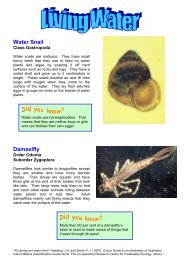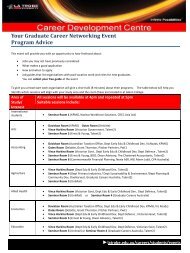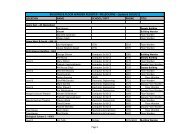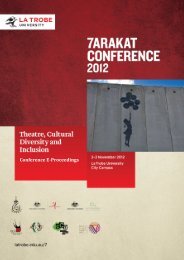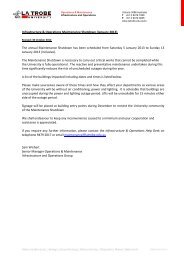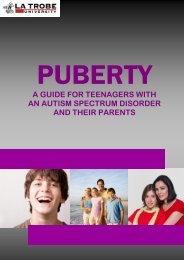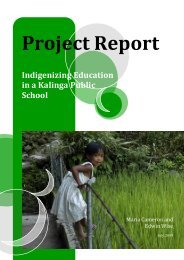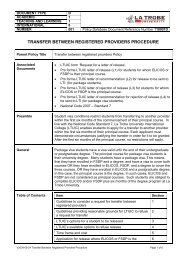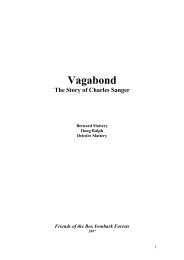The In2science Team - La Trobe University
The In2science Team - La Trobe University
The In2science Team - La Trobe University
Create successful ePaper yourself
Turn your PDF publications into a flip-book with our unique Google optimized e-Paper software.
Welcome to the September news update from the <strong>In2science</strong> Peer Mentoring program. We are<br />
now into week 5 of our semester two placement block and the Peer Mentors have been<br />
actively participating in a wide range of activities in the school. <strong>The</strong> <strong>In2science</strong> <strong>Team</strong> have been<br />
visiting the Mentors on placements and have really enjoyed seeing the learning that is taking<br />
place in the schools. It is great to see our Peer Mentors being so actively engaged in the lessons<br />
and the students seeing them as “young scientists”. Unfortunately children don’t see their<br />
teachers as ‘scientists’, however, they are able to put this label onto the Peer Mentors.<br />
<strong>In2science</strong> News<br />
John receives his award from Professor John<br />
Hay AC, Chair of the ALTC Board<br />
<strong>In2science</strong> UPDATE – September 2009<br />
Edition 6.5<br />
Congratulations to our own John<br />
McDonald, <strong>In2science</strong> Manager, on his<br />
latest award. John received an Australian<br />
Learning and Teaching Council (ALTC)<br />
citation for outstanding contribution to<br />
student learning at a presentation on 10<br />
August at the NGV.<br />
www.latrobe.edu.au/in2science/<br />
Long serving Mentors ‐ <strong>La</strong>st semester saw a record fourteen of our<br />
Peer Mentors complete their third semester of placement.<br />
Students from the <strong>University</strong> of Melbourne received their Letter of<br />
Commendation at a recent lunch with Associate Dean<br />
(Development & Community); Professor Phil Batterham.<br />
<strong>In2science</strong> External Evaluation – we recently finalised the first part of a major evaluation of the <strong>In2science</strong> program.<br />
This evaluation has been led by Dr Kerri‐Lee Harris from the Centre for the Study of Higher Education (CSHE). <strong>The</strong><br />
evaluation took an in‐depth look at several schools which have been associated with the program and involved many<br />
interviews with staff and students. <strong>The</strong> report shows the benefits that can be achieved from a school’s point of view.<br />
Here are some excerpts from the executive summary. <strong>The</strong> full report can be found on our website (pdf file).<br />
“<strong>The</strong> program leads to more interactive and practical‐based science classes, drawing on current science knowledge<br />
and techniques. Mentors introduce students to science learning ‘beyond school’, and build connections between<br />
science, and students’ own interests and experiences.<br />
<strong>In2science</strong> helps to build students’ confidence in science. For many students, the greatest deterrent to continuing in<br />
science study is a lack of self‐belief. <strong>The</strong>re is evidence that <strong>In2science</strong> mentors help students overcome this barrier.<br />
Mentors also serve as valuable role models. As young people with their own diverse interests and backgrounds,<br />
mentors present a ‘face of science’ that often surprises school students, and with which students can readily relate.<br />
<strong>The</strong> results of the study highlight the potential for <strong>In2science</strong> to significantly enhance the teaching of science in<br />
secondary schools. Importantly, the influence of the program extends well beyond the direct assistance provided by<br />
the mentors during their time in class.<br />
Teachers’ engagement with <strong>In2science</strong> mentors has a sustained and systemic influence on the practice of science<br />
teaching in participating schools: teachers are exposed to current science and knowledge that complements their<br />
own knowledge; science classes become more interactive; and teachers are more willing to collaborate and share
ideas. <strong>The</strong> principals at each of the case‐study schools emphasised the benefit of <strong>In2science</strong> in terms of the<br />
professional development of their science staff.<br />
A defining characteristic of the <strong>In2science</strong> program is its collaborative, multi‐university approach. Unlike university<br />
outreach initiatives which seek to recruit students to particular institutions or particular courses, <strong>In2science</strong> aims to<br />
promote students’ engagement with science learning more broadly. <strong>In2science</strong> mentors are perceived as ‘young<br />
scientists’, not as representatives of their particular universities.<br />
<strong>The</strong> contribution of <strong>In2science</strong> to science learning in schools is a distinctive one. Even in schools with an existing focus<br />
on science, and with various other initiatives in place to promote science learning, the contribution of the <strong>In2science</strong><br />
program is highly valued. <strong>In2science</strong> is seen to complement other science‐related initiatives, and schools describe<br />
mentors as ‘adding value’ to other science programs.”<br />
Evaluating university‐to‐school peer mentoring in science: the influence of the <strong>In2science</strong> program in Victorian schools – CSHE<br />
August 2009<br />
<strong>In2science</strong> Prizes<br />
Once again we have a number of prizes to give away to participating teachers and university students. This semester we<br />
are grateful to following for their kind donations:<br />
Prize Donated by:<br />
1x Teacher ‐ Nature of Biology – book 1<br />
1x Teacher ‐ Nature of Biology – book 2<br />
1x Teacher ‐ Nature of Biology – book 2 – teachers resource manual<br />
1x Mentor ‐ Science Alive – level 6<br />
1x Mentor ‐ Science Quest 1<br />
1x Mentor ‐ Science Quest 2<br />
1x Mentor ‐ Science Quest 3<br />
A year subscription to Australian science magazine COSMOS<br />
1x Teacher<br />
1x Peer Mentor<br />
Global warming mug<br />
1x Teacher<br />
2x Peer Mentor<br />
6 teachers who teach Chemistry or have an interest in Chemistry will have the<br />
opportunity to participate in hands on activities within laboratories at the<br />
Department of Medicinal Chemistry, Pharmacy and Pharmaceutical Sciences,<br />
Monash <strong>University</strong>, Parkville.<br />
This will occur at a date to be decided in December ‘09<br />
6x Teachers (2 from each of three winning schools)<br />
One year’s annual subscription to STAV (or free registration at a STAV<br />
conference if already a member)<br />
X1 teacher<br />
One year’s annual student subscription to STAV<br />
X1 Mentor<br />
<strong>The</strong>se prizes winners will be announced in the October issue of Update.<br />
Jacaranda books<br />
John Wiley & Sons Ltd<br />
www.jaconline.com.au/<br />
Cosmos Magazine<br />
www.cosmosmagazine.com<br />
Luna Media<br />
<strong>In2science</strong><br />
<strong>The</strong> ARC Centre of Excellence<br />
for Free Radical Chemistry and<br />
Biotechnology<br />
www.freeradical.org.au/<br />
Science Teachers Association<br />
of Victoria<br />
www.stav.vic.edu.au<br />
Science Teachers Association<br />
of Victoria<br />
www.stav.vic.edu.au<br />
<strong>In2science</strong> roadshows – this year we are running two roadshows to regional Victoria. <strong>The</strong> In2nanotech roadshow will<br />
visit schools in the northern and alpine areas. Schools already booked in are Wangaratta HS, Euroa SC, Mansfield SC,<br />
Beechworth SC, Bright P‐12 Coll and Myrtleford P‐12 Coll.
We will also be running a biotechnology roadshow in conjunction with the Get into Genes program. Called In2biotech,<br />
this will look at the issue of climate change and the work being done to use biotechnology to address these issues from<br />
an agricultural perspective. This roadshow will be visiting schools in the Wimmera district.<br />
Both roadshows will be running the first week of December and we look forward to visiting the schools and working with<br />
their students.<br />
<strong>In2science</strong> Day for Y9 students Wednesday 2 December 2009, the <strong>University</strong> of Melbourne<br />
<strong>The</strong> <strong>In2science</strong> program would like to invite Year 9 students in our partner schools to attend a day of exciting science<br />
activities to be held at the <strong>University</strong> of Melbourne's Parkville campus.<br />
WHEN: Wednesday 2 December 2009 from 10.00 ‐ 2.15<br />
Your class(es) will have the opportunity to explore different aspects of science and technology by way of practical<br />
activities, interactive seminars and demonstrations. <strong>The</strong> day will finish with a bang during the physics show. Our<br />
current Mentors will also be participating on the day; a chance to see them in their own environment!<br />
Classes will be allocated to the sessions on a first‐in‐best‐dressed basis with all students participating in one practical<br />
based activity, and one lecture based activity. This will allow them to experience a range of tertiary teaching and<br />
learning styles.<br />
To Register<br />
Email Alison Wray at the Faculty of Science, <strong>University</strong> of Melbourne at asw@unimelb.edu.au or (03) 8344‐4367 by<br />
Wednesday 4 November.<br />
Please include your name, your schools name, contact details, name of the Mentor currently working with your class,<br />
and the number of students that you aim to bring on the day.<br />
Please note ‐ We wish to ensure that current Year 9 classes working with a mentor have the first priority to be<br />
involved, however, if you feel that other year 9 classes would benefit, then please indicate this in your registration<br />
email.<br />
Four partner schools attended our pilot event in 2008. One of the link teachers made these comments “A very<br />
constructive day which gave the students an opportunity to explore the different areas of science.<br />
<strong>The</strong> activities were engaging, the students were kept on task for the entire time they were at the university, the<br />
program gave the students a realistic feel of what it is like to be in a university setting ".<br />
We look forward to welcoming your students.<br />
Mentoring in Action<br />
Since the start of Semester 2 many Mentors have been actively involved<br />
in a variety of science and mathematics classroom activities. Mentor<br />
involvement has extended to helping with practicals, worked on small<br />
group activities and presented a ‘show and tell’ about themselves and<br />
their work at <strong>University</strong>. Here are some examples of what our<br />
Mentors have been up to so far this semester:<br />
Mentor Summer is on placement at <strong>La</strong>lor North SC. She has had the<br />
opportunity to introduce some simple practicals and help the students get<br />
engaged in both science and maths. Well done Summer.<br />
At Bundoora SC, Mentor Shainie has been helping Y7 students get to grips<br />
Mentor Shainie explains how to stain a<br />
microscope slide
with using microscopes. Students were shown how to set up a slide and add a stain to enhance the sample. Students<br />
were extremely excited and found many things to view under the microscope. Well done Shainie.<br />
At East Doncaster SC Mentor Lori (now on her fourth placement at the school) has been helping students in Y9<br />
understand nutritional content of food as well as helping them revise for tests in chemistry and biology. Also at the<br />
school is Mentor Simone who has been helping out in psychology and with Y7 science. Great effort Lori and Simone.<br />
At <strong>University</strong> HS we have four Mentors. Mentor Charlotte has been sharing her passion for neuroscience by helping the<br />
students with brain dissections. She had a few cool stories and extra information to share with the students. Also at the<br />
school is Mentor David. He has been helping classes understand how viruses work. He was able to do a great explanation<br />
on the board about how a virus invades a cell and reproduces itself – very interesting David.<br />
At <strong>La</strong>keside SC Mentor Krystal has been helping students in Y9 understand earthquakes and make fossils. She has also<br />
shown them photos taken on a recent field investigation in the bushfire affected area around Kinglake. Krystal and<br />
fellow university students were sampling the invertebrates in streams there. Very interesting to see what impact the<br />
fires have had – real science in action!<br />
Mentor Sharee at Wantirna College has been having a great time interacting with the students and helping one class<br />
with the topic of ‘Earth and Space’ and she too is enjoying working with the students on this topic as she too is<br />
discovering more about environmental sciences. Her other class is investigating cells and the circulation system. Also at<br />
the school is Mentor Jenny. Jenny is on her second placement at the school and this time is helping out in science. <strong>The</strong><br />
students have been doing flame tests to see what colours are produced when you spray different metals into a flame.<br />
Jenny also got to explain some of the theory to the students. Well done Jenny.<br />
Mentor Ruth helps students ‘get to<br />
grips’ with picking up beans with<br />
different beak types.<br />
Eltham HS has three Mentors this semester. Mentor Bec has been actively<br />
helping out in the science classes and was able to put her animal handling<br />
skills to good use allowing students to get up close with the school lizards and<br />
python. Also at the school, Mentor Ruth has been helping Y10 students<br />
understand species adaptations in birds. <strong>The</strong> students had to experiment with<br />
different examples of beak types and try to pick up different food types to<br />
identify which were the most suited. Both students and Mentor had a great<br />
time. Well done.<br />
Mentor Tash is working with Year 10 students at Ringwood SC who are<br />
investigating the environment. Tash has been helping the class understand<br />
the changes that they can bring about as they reduce their own energy use<br />
within their home environment.<br />
At Wheelers Hill SC Mentor Dee has been engaging Year 8 students in investigating “How We See”. Working with small<br />
groups of students Dee and the class teacher used a PowerPoint presentation, model of the eye and information poster<br />
to allow the students to generate some very interesting questions relating to the topic of sight.<br />
Mentor Amanda has helped organise a visit for Y9 students from Greensborough College to participate in some physics<br />
activities at <strong>La</strong> <strong>Trobe</strong> <strong>University</strong>. Students had the chance to investigate sound and optics through some very hands‐on<br />
experiments. Many thanks to Dr David Hoxley and Bob Aikenhead for running these activities and thanks also to Mentor<br />
Heidi for offering her support too.<br />
At Epping SC Mentors Hannah and Nicole have been helping the students learn about zoology by investigating mice. <strong>The</strong><br />
students have been measuring and weighing their mice on a weekly basis to monitor their growth. Mentor Nicole<br />
deserves a special prize as she has been overcoming her fear of mice ‐ our Mentors really do go out of their comfort<br />
zone on placement! Well done.<br />
At Balwyn HS Mentor Xin‐Fang has been able to talk to the Y10 students about subject selection. <strong>The</strong> students really do<br />
listen to what the Mentors have to say about their own career path. Thanks for sharing your story with the students.
Footscray CC has three Mentors again this semester. Mentor Cemil has been helping out in science and has enjoyed the<br />
interaction with the students. “Initially students were a little reserved but once they got to know me they are more than<br />
happy to ask for help and advice”. Also at the school is Mentor <strong>La</strong>ch. He has been helping out with Y8 students as they<br />
get to grips with physics. <strong>La</strong>ch has been in his element as physics is his major. He has been able to share his passion and<br />
knowledge and help the teacher to engage the students. Well done <strong>La</strong>ch.<br />
Mentors Justine and Mardi are on placement at St Helena SC. Both are having a great time and really enjoying<br />
placements in maths classes. Both have commented about how valued they feel in the class by the students and<br />
teachers and feel they are making a difference to the students understanding, and most importantly, confidence in<br />
mathematics. Great work.<br />
New school to the program; Canterbury Girls SC, has two Mentors this semester. Mentor Erin is now on her 4 th<br />
placement though this was the first time she has been involved in brain dissections in class! Erin was able to help the<br />
students and learn about the parts of the brain herself. Well done Erin.<br />
Mentor Jackie has been helping out with some Y8 science experiments at Kew HS. Students have been investigating<br />
elements and compounds and a quick experiment to look at the reaction of magnesium with oxygen when heated<br />
helped the students understand.<br />
At Northcote HS, Mentor Emma has been working with students as they get to grips with acids and bases. She has also<br />
been helping students catch up on some of their experiments. Well done Emma.<br />
We look forward to making further visits to see the Mentors in action over the coming weeks.<br />
Information for Schools<br />
<strong>The</strong> recent CSHE evaluation highlights many of the benefits that can be achieved in schools from participation in the<br />
<strong>In2science</strong> program. One of the core requirements was the need for good communication both within the school, and<br />
with the <strong>In2science</strong> program and Mentors by the schools. <strong>The</strong> Link teacher is our most valuable point of contact with the<br />
school and we hope that all our Link Teachers have been able to keep an overview of what is happening regarding the<br />
Mentors in the classes. <strong>The</strong> Link Teacher is the backup person for the Mentor if they experience any difficulty or their<br />
class teacher is away. Hopefully all Link Teachers have had chance to meet the Mentors in person and provide the<br />
opportunities for the teachers to talk about their experiences and share ideas with each other.<br />
<strong>The</strong>re have been a few cases of teacher not fully understanding the role of the Peer Mentor in the class. Please ensure all<br />
teachers have seen a copy of the booklet “Getting the most out of the <strong>In2science</strong> Peer Mentoring Program”.<br />
Many thanks to all the teachers who have welcomed Mentors into their schools and classrooms during Term 3. We<br />
have found that the maximum impact of having a Peer Mentor is gained where classes are doing either practical work,<br />
group tasks, discussions or individual projects as this provides the opportunity for the Mentors to interact. <strong>In2science</strong><br />
encourages teachers to try new activities or methods of organising the class with the support of the Mentor. Many<br />
teachers comment that the ‘extra pair of hands’ is a real asset and gives them the confidence to try different pedagogy.<br />
If teachers wish to undertake activities that may require additional support from the universities, your initial contact<br />
should be with the Mentor who can then liaise with the <strong>In2science</strong> <strong>Team</strong> and possibly other staff at the university.<br />
<strong>In2science</strong> is very keen to support activities which help engage students with the university community.<br />
<strong>The</strong> Science Experience – Your Y9 students may be interested in participating in the science experience this year<br />
(formerly Siemens Science Experience). All three partner universities will be hosting events. Check out the website to<br />
find out more.<br />
Information for Mentors<br />
Placements will run until the week of 26 October. <strong>The</strong> semester is 11 weeks in length and there will be a school term<br />
break between the 18 September and 5 October
Schools break up for two weeks holiday on Friday 17<br />
September.<br />
Facebook – We now have well over 50 Mentors, past and present signed up for the <strong>In2science</strong> group. It is great to see<br />
Mentors sharing their experiences and seeking advice from each other. If you have not had a look then please do so. Do<br />
contribute to the discussions and post questions you have regarding activities you are doing on placement. <strong>The</strong> more use<br />
the discussions get, the more it can benefit everyone – happy blogging.<br />
Mentor Help ‐ We still require some more Mentors to help out on the <strong>In2science</strong> Day at the <strong>University</strong> of Melbourne on<br />
Wednesday 2 December. If you can spare some time please contact Alison asw@unimelb.edu.au.<br />
Many thanks for all your commitment and had work so far this semester. Many of you are now experienced Mentors<br />
with two or three placements completed. Others are experiencing for the first time the excitement and pleasure of<br />
being a Mentor. As a result of your ongoing commitment as a Mentor, many of you are becoming very proficient at<br />
identifying the needs of the students and responding to them. Try to show initiative where possible and don’t feel shy<br />
about offering to bring something to show the students or suggest an activity you think the students may enjoy.<br />
Many of you are becoming proactive in the classroom interaction you are having with the students; asking them about<br />
the work they are doing and engaging them in meaningful conversation – well done! Where possible, relate the class<br />
work to the work you are doing at university.<br />
Remember to encourage the students to explain their ideas and understanding of the work they are undertaking. A<br />
good Mentor has good listening skills.<br />
Praise and encouragement go a long way with everyone – use it to your advantage. <strong>The</strong> stickers and rulers help too!<br />
Contact us if you need more.<br />
Do talk to the class teachers you are working with to see if there is anything they would like support with during the rest<br />
of the placement.<br />
Do keep us informed if there are issues or you cannot make<br />
We will begin recruiting for 2010 in October.<br />
If you have friends interested get them to<br />
contact one of the <strong>In2science</strong> <strong>Team</strong> or apply<br />
online<br />
News from the Institutions<br />
it for a particular week. <strong>The</strong> more we are kept in the loop<br />
the easier it is for us to solve problems.<br />
Don’t forget to keep a record of your travel expenses for<br />
reimbursement of up to $10.00 per week. Travel claim<br />
forms are located at the back of your Peer Mentor’s pack or<br />
on the website.<br />
<strong>La</strong> <strong>Trobe</strong> <strong>University</strong><br />
Talk and Tour<br />
<strong>The</strong> very last Talk & Tour session will be held on 24 September, 2009 at the Bundoora campus. This time we have<br />
introduced an additional session for TAFE pathway students to come on board as well.<br />
When: Thursday 24 September, 9:30am to 12 noon, with optional afternoon activities<br />
Where: Glenn College, Bundoora campus<br />
Whom: Year 10, 11, 12 students and parents<br />
<strong>The</strong> <strong>University</strong> of Melbourne<br />
<strong>In2science</strong> Y9 event Wednesday 2 December (see information above)<br />
Podcast – 400 years of Astronomical Telescopes<br />
Well worth a listen.
One nano‐step closer to weighing a single atom<br />
By studying gold nanoparticles with highly uniform sizes and shapes, scientists now understand how they lose<br />
energy, a key step towards producing nanoscale detectors for weighing any single atom.<br />
Movie reviews with a twist of science<br />
Read film reviews and see the links to current science<br />
Harry Potter and the Half Blood Prince<br />
Monash <strong>University</strong><br />
Astronomy in a Nutshell<br />
2009 is the International Year of Astronomy (IYA). Monash <strong>University</strong> Astronomers have developed an exhibition<br />
that explores and explains astronomy.<br />
Date: Friday May 15, 2009 to Wednesday December 23, 2009<br />
Time: 10am until 5pm, Monday to Friday<br />
Venue: Building 74, Monash Science Centre, Clayton campus<br />
Cost: free<br />
Glow in the dark' red blood cells made from human stem cells<br />
Victorian stem cell scientists from Monash <strong>University</strong> have modified a human embryonic stem cell (hESC) line to<br />
glow red when the stem cells become red blood cells. <strong>The</strong> modified stem cell line represents a major step towards<br />
generating mature, fully functional red blood cells from human embryonic stem cells.<br />
Websites to try<br />
Here are a couple of sites that may be of interest:<br />
SourceBook Version 2.1 is an excellent collection of pracs and demonstrations compiled by the American Chemical<br />
Society, which is now on the shelves in the <strong>University</strong> of Melbourne Chemistry Library at 540 SOUR. <strong>The</strong> content was<br />
compiled by large teams of experienced teachers and is certainly worth looking at for ideas about new pracs for next<br />
year and would also be fantastic for first‐time VCE chemistry teachers.<br />
Thirty‐six modules in four large volumes cover aspects of chemistry useful from year 9 to first year students as well as<br />
specialty topics, like photochemistry and forensic chemistry. Each module contains teacher background material, labs<br />
(student and teacher versions, with safety duly noted), demos, history, analogies, humour, related materials and skills,<br />
objectives, key questions for students, concept maps, student misconceptions, teacher tips, and links to other topics and<br />
disciplines, and media resources. <strong>The</strong> latest version is version 2.1. Most of the work from the original volume, 1.0 (1994),<br />
is available online as pdf files at<br />
http://dwb4.unl.edu/chem_source_pdf/ChemSource.html<br />
Thanks To Mick Moylan from Chemistry Connections for this one.<br />
<strong>The</strong> Institute of Physics in the UK has some great resources for teaching students in the higher year levels.<br />
Did you know 2010 will be the International Year of Biodiversity as designated by the UN.<br />
<strong>The</strong> <strong>In2science</strong> <strong>Team</strong><br />
John McDonald Jacinta Hubble Alison Wray<br />
j.mcdonald@latrobe.edu.au Jacinta.hubble@lsci.monash.edu.au asw@unimelb.edu.au<br />
I


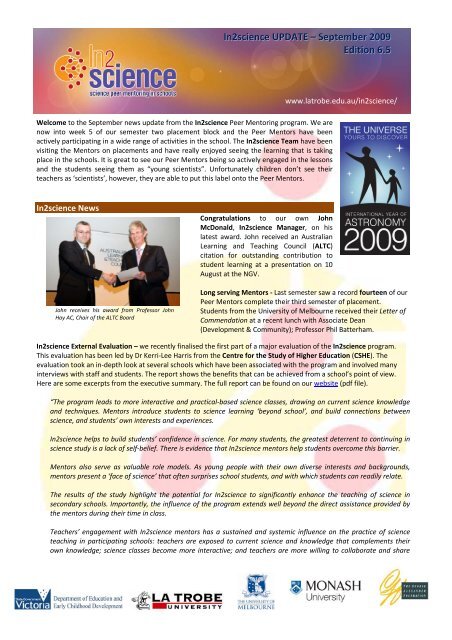
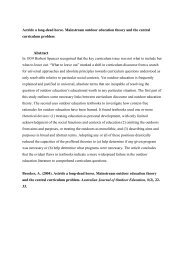
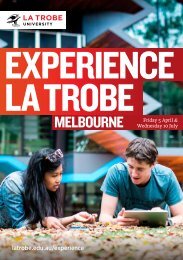
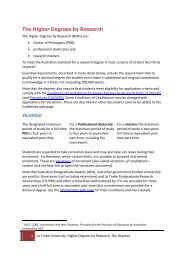
![Ottoman Empire course brochure [PDF 612KB] - La Trobe University](https://img.yumpu.com/12001562/1/184x260/ottoman-empire-course-brochure-pdf-612kb-la-trobe-university.jpg?quality=85)
![Getting Ready to Talk Manual [PDF 315KB] - La Trobe University](https://img.yumpu.com/11430807/1/190x245/getting-ready-to-talk-manual-pdf-315kb-la-trobe-university.jpg?quality=85)
